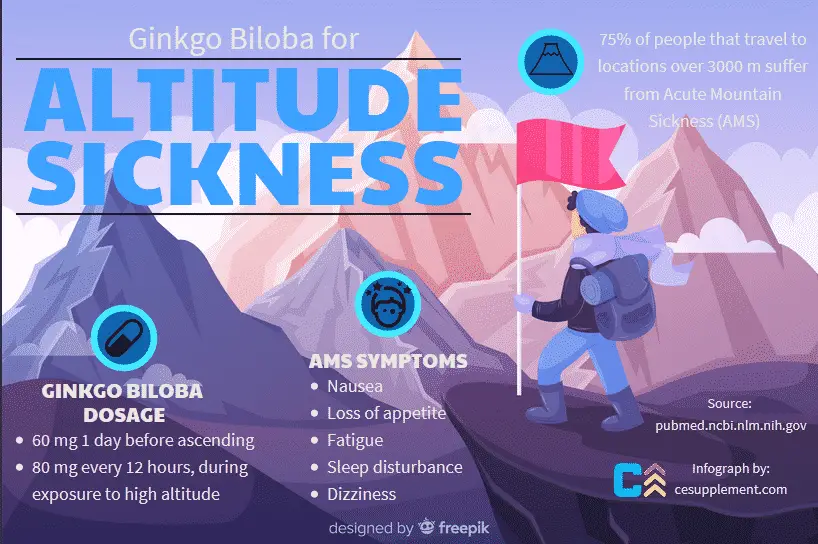Ginger is believed to help quite a bit with altitude sickness especially when its more mild. Some food sources that provide these minerals include fatty fish meat eggs carrots nuts tofu whole wheat pasta shiitake mushrooms sweet potatoes spinach cantaloupe lettuce red bell peppers apricots and broccoli.
 How To Take Ginkgo Biloba For Altitude Sickness Dosage Info
How To Take Ginkgo Biloba For Altitude Sickness Dosage Info
If you have HACE you might need a steroid called dexamethasone.

What helps with altitude sickness. Do not smoke drink alcohol or exercise. For most people it causes mild symptoms that improve with rest and time spent getting used to altitude. Dexamethasone can also be used preventively but it can have serious side effects.
The following list of medications are in some way related to or used in the treatment of this condition. Stop and rest where you are. Medications for Altitude Sickness Over-the-counter remediesibuprofen acetaminophen and aspirinall help relieve the headache associated with AMS and HACE.
Altitude sickness can affect people who climb or travel ascend to more than 2500 metres 8000 feet altitude particularly if they ascend too quickly. Select drug class All drug classes carbonic anhydrase inhibitors 3 glucocorticoids 5 carbonic anhydrase inhibitor anticonvulsants 3 Rx. One of the best ways to help your body adjust to high altitude is to drink more water.
The medication acetazolamide can reduce symptoms of altitude sickness and help improve labored breathing. Thats why Stanford emergency and wilderness physician Grant Lipman MD is investigating medications that can help recreational mountaineers as well as rescue crews stave off its effects particularly if they need to ascend with short notice. Make sure youre drinking enough water.
High-altitude areas have low humidity which keeps. If you have a headache take ibuprofen or paracetamol. Some research indicates that taking ginkgo biloba may help reduce the risk of acute mountain sickness.
Top 7 Tips for Altitude Sickness Prevention 1. Due to the many health benefits of ginger it is one of the most commonly used herbs when it comes to any sort of stomach issue digestion nausea and as such it is often suggested for altitude sickness as well. Alpha-linoleic acid ALA is also said to help stave off symptoms of altitude sickness.
There are three main types of high-altitude illness. Your body needs about two to three days of slowly going higher in order to adjust to the changes. Drugs used to treat Mountain Sickness Altitude Sickness.
You may also be given the steroid dexamethasone. Its unlikely that youll have access to lots of fresh foods while climbing or hiking but do your best to avoid lots of high-sodium and synthetic processed foods that can make digestion harder. Acetazolamide Diamox is one most commonly prescribed medications to treat altitude sickness or decrease the symptoms of altitude sickness.
Its not often were told to eat extra carbohydrates. Its not uncommon for the headache to persist though after these medications are taken. It works by making the blood more acidic.
If you think you have altitude sickness. 1 acute mountain sickness also called AMS 2 high-altitude pulmonary edema also called HAPE which affects the lungs and 3 high. Do not go any higher for at least 24 to 48 hours.
Acidic blood causes you to to breathe deeper and. Other treatments include a lung inhaler. If you have HAPE you will need supplemental oxygen and may need medications as well as moving to a lower altitude.
But when youre at a higher altitude you need more. If you feel sick take an anti-sickness medicine such as promethazine. Get plenty of rest and drink 2 to 3 liters of water a day if youre taking a trip with altitude variations and consider asking your doctor about prophylaxis medications that can help prevent altitude sickness.
Can certain foods or vitamins help with altitude sickness. Altitude sickness can be extremely debilitating and at its most severe deadly. Taking it 24 hours before traveling to a high altitude and continuing for five days can help prevent altitude sickness.


